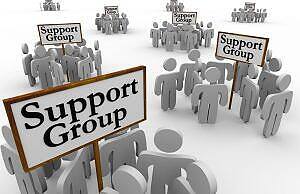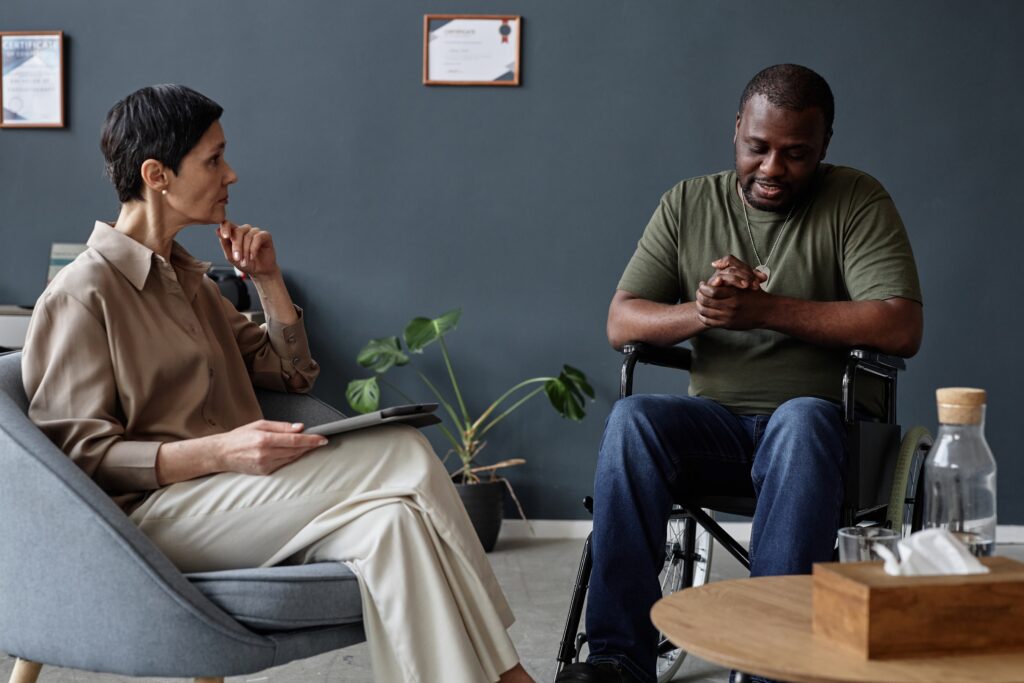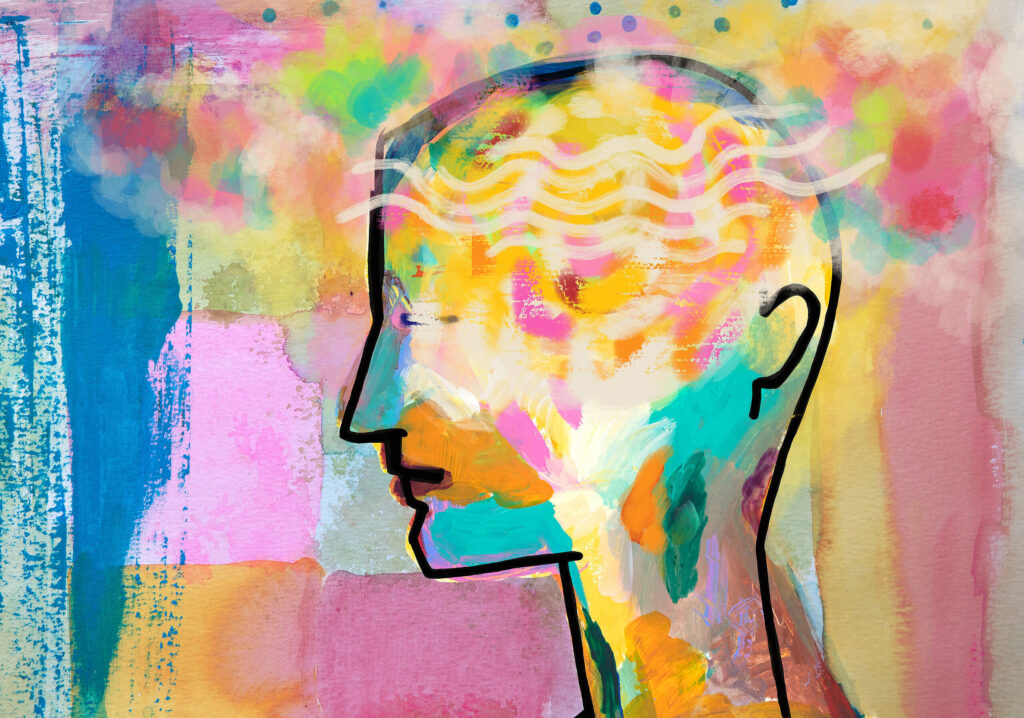The 12-step programme is the method used by the AA and other addiction groups to guide members on their recovery journeys. Found around the world, the 12-step guide guides people through the stages of recovery, giving a clear idea of the future and the twelve steps needed to get there.
The 12 steps were developed by Alcoholics Anonymous, which, as one of the biggest recovery groups in the world, has the opportunity to try and test this approach extensively.

Its success in treating alcohol addiction has led it to be successfully adapted to help those who suffer from drug addiction or process addiction (addiction to an activity, behaviour or person). This means that any individual suffering from this life-threatening disorder can access a free support network and apply the steps to their life.
But what is it about the 12 Steps and the group setting in which meetings are held that are vital to helping addicts? And why is it so important to regularly attend meetings even once the drinking and drugging have been stopped?
How the 12 Steps Started
The original foundations of the Alcoholics Anonymous recovery programme were laid down in 1935 in Ohio, America.
Two individuals, both suffering from chronic alcoholism, came together to help one another to recover. One was a stockbroker named Bill Wilson, and the other was a surgeon called Dr Bob Smith. Neither man had qualifications or training in treating alcohol addiction, but both had suffered tremendously at the hands of the illness.
In 1939, they penned a list of philosophies and methods that play a hugely significant role in the principles of AA and other support groups that are in existence today.

The 12-step programme was further tailored to be all-inclusive, so a programme of recovery that could benefit anyone of any ethnicity, background, religion, or social standing was born.
The 12-step programme of recovery, as outlined in the Big Book of Alcoholics Anonymous, was found to be so successful that AA’s existence flourished, saving millions of individuals who would have otherwise died from an alcoholic death.
12-step meetings are a group of alcoholics or addicts that share a common problem and meet in a public but private place to offer emotional support to each other. The meetings also advocate the 12-step programme as a means of recovery and encourage its members to strive and live by its principles.
What Are the 12 Steps?
Step 1 is about letting go. You admit you have a problem and begin to seek out help. It isn’t easy, but admitting powerlessness allows you to break the cycle of addiction that you’ve been stuck in.
Step 2 is believing that a power greater than yourself can help you recover. This can mean God or faith in your community, but you have to accept that you can’t do this alone.
Step 3 Make the decision to turn over your will and life to the higher power as you believe in it.
Step 4: Consider our past and current actions and decisions and why morally we took those actions.
Step 5 Admit to ourselves and our higher power what we have done wrong and why.
Step 6 Be ready to change and improve these negative behaviours and ideas.
Step 7 Ask for help to overcome these problems.
Step 8 List people we have hurt or wronged and be willing to make amends where possible.
Step 9 Make amends for our previous actions where we can without causing further harm.
Step 10 Continue to consider our negative behaviour and personal flaws and admit when we are wrong.
Step 11 Improve our relationship with our higher power and ask for help to carry out our recovery.
Step 12 Carry the message and help other alcoholics who need us.
The overriding idea central to AA is that alcoholism (addiction) is a disease that cannot be cured but that sufferers can recover and learn to manage it with the assistance of the 12-step recovery programme and the support of other members.
Indeed, the theory from AA that alcoholism is a disease has now been proven by modern medical scientists.
Science and medicine have found that alcohol and drugs hijack the brain. Alcoholism and drug addiction are now medically recognised as life-threatening brain/behavioural disorders, which are chronic and progressive in nature. So far, no cure has been found to reverse the physical nature of addiction successfully. However, addiction is now far better understood as an illness that can be treated.
12-Step Program in the UK
Across the UK, groups such as the AA and NA use the 12-step program to help people living with addiction. Many rehabilitation centres favour this approach as well. Not only because it is tried and tested but also because so many UK support groups use it for continuing recovery. This means that you can continue with the steps in a local group when you leave rehab, and continuity is important.
If you look for help in the UK for addiction, most programs will be based on the 12 steps, although the exact details will vary. In particular, secular groups will offer more flexibility around the higher power that you believe in. For example, science and medicine-based groups may believe in accepting that your brain and biology are a higher power.
12 Steps vs Professional Addiction Treatment
Before answering these pertinent questions, it is worth clarifying that addiction treatment groups can either be professionally led or non-professional led. 12-step groups are not professional-led yet still have great success.
Professionally led groups and addiction treatment programmes, i.e. groups and treatments facilitated by qualified addiction counsellors and specialists, often have a vital role in many addicts’ recovery. They are, however, less accessible in that they can be dictated by time and money.
12-step fellowships should never be considered a substitute for professional medical and therapeutic treatment. Yet, we wonder how a group of unqualified individuals with a chronic and progressive illness for which there is no known cure can help each other recover and stay in recovery on a long-term basis.
While professional addiction treatment and non-professional support groups offer very different things to individuals suffering from addiction, they can often complement each other very well.
12-step Rehab
Many detox clinics and rehab centres worldwide incorporate essential elements of the 12-step programme into their treatment. They do this for two main reasons :
- The 12 Step recovery programme is one of the most effective proven methods of treating addiction
- It introduces patients to fellowships so that they can continue to access support on returning to the community
12-step fellowships offer a way of living that is far removed from active addiction. Members are encouraged to live a spiritual life, with their primary purpose being to help others who suffer from the same addiction.
Leading a life of helping others has proven to help many addicts recover. In active addiction, a sufferer’s primary purpose is to feed their addiction regardless of the cost to their own well-being and those they love. By giving the newly sober/clean addict a new purpose and focus, they find they can think of other’s needs as opposed to their old self-serving way of life.
Belonging – a basic human need
Many psychologists have identified a sense of belonging as a fundamental motivational need. Feeling part of a group and being accepted by our peers helps us feel valued and increases our self-esteem. It is this basic need to belong that fellowship meetings assist with fulfilling.
Active addiction lends to isolation and loneliness as their illness progressively consumes the sufferer, pushing them away from those they love. Dysfunctional and harmful behaviours contribute heavily to others abandoning the addict to safeguard themselves.
Isolation becomes a way in which those who suffer from addiction deal with rejection, judgment and abandonment. This behaviour serves no purpose in recovery and must be changed if an addict is to achieve a quality life.
Attending 12-step meetings helps many addicts break away from isolation and build meaningful and productive relationships with others. They can form a simple connection through shared feelings and experiences, even when their backgrounds are very different. They begin to, at last, feel a real sense of belonging.
However, this sense of belonging can quickly be removed if the individual chooses to stop attending meetings. They can find that their old ways of thinking and behaving start to creep back in. Life becomes painful once again, and this is where they become most vulnerable to relapse or living a sober life as a dry drunk.
Having a belief in a power greater than yourself
If you attend a meeting, you are likely to hear the word God mentioned. This can send many individuals running for the door! However, it is worth bearing in mind that the God referred to does not have to be a religious one but is your own concept of what a power greater than you means.
Some members refer to “God” as truth, love or a connection to their conscience; others use a religious God. Whatever your beliefs are, it is worth attending a few meetings before deciding if 12 steps are for you.
Many members enter the doors of 12-step fellowships, agnostic or atheist. Still, they undergo such a profound change by applying the steps they come to believe there must be a higher power than themselves responsible for saving their lives and others.
Sharing your feelings
Research shows that attending groups/meetings has many critical psychological benefits, one of which is finding relief through sharing painful thoughts and feelings. The simple act of expressing your deepest troubles without fear of judgement or ridicule is a hugely emotionally beneficial act, regardless of any contribution from others.
12-step meetings also provide an avenue to receive hope, empathy and genuine encouragement from others, all of which are vital to maintaining personal motivation to stay on the path to recovery.
Personal identification
Even though AA was probably one of the earliest support groups set up to help people who were having problems with alcoholism, there are now many other specific 12-step groups worldwide.
Each different fellowship applies a successfully adapted version of the original 12 Steps to a specific addiction. 12-step fellowships are now in existence to help anyone suffering from a manifestation of addiction, whether to alcohol, gambling, drugs, food, relationships or sex.
Each addiction has its own particular set of challenges and consequences to face and overcome. The fact that fellowship groups are now more diverse means that group members can now benefit from more specific knowledge, understanding and a sense of belonging.
CBT & the 12-steps
Cognitive behavioural therapies have been used effectively in the treatment of addiction for many years. There are many different types of cognitive behavioural therapies around, and all work in slightly different ways to treat psychological disorders and mental health illnesses.
Private rehab treatment programmes are made up of several person-centred therapies designed to bring about a considerable shift in the patient’s cognitive processing. The 12 steps, when completed in their entirety and continued as a means of maintenance and growth, also achieve a significant cognitive shift. This shift in the individuals’ thinking and actions enables them to stay substance-free and break away from dysfunctional behaviours. The most significant way to discipline the mind and therefore, connect with truth is to spend regular time in prayer and meditation.
12 Step support groups for family members
There is arguably nothing more painful than watching a loved one slowly die from addiction. The overwhelming feelings of powerlessness, hopelessness and failure can literally destroy families and affect individual family members’ mental health.
12-step support groups for family, friends and loved ones of addicts have become very popular. Finally, there is an outlet for family members and those affected by another’s addiction. These family-oriented support groups follow a similar set of principles and traditions to those offered to the addict.
These groups offer meetings and a recovery programme so that family members and loved ones can learn about the nature of addiction, ensure they are not enabling their loved one’s addiction and learn to live their own life once again with support from other members.
Many rehab clinics and addiction professionals also recommend the benefits of family members and those closest to the addict regularly attending such groups.
Due to the increased popularity of these groups and the diversity that is now offered through meetings, loved ones of those suffering from specific addictions can also find more specific support. Alcoholics Anonymous AA, Cocaine Anonymous, and Narcotics Anonymous are just a few of the 12-step fellowships that provide sister support groups for family members.
Are the 12-steps Helpful?
While we would reinforce that the 12 steps are not a substitute for professional medicine, treatment and therapy, it does assist numerous individuals in maintaining recovery from active addiction.
As a support group with no dues or fees to pay, members are free to come and go as they please. The 12-step program works best for those highly motivated to change.
While 12 Step works for many, some individuals do not best suit or require a more comprehensive form of professional treatment to assist them in stopping alcohol or drugs first.
Due to addiction overpowering some individuals completely, they may require an inpatient detox and a safe, substance-free environment to establish the foundations of their recovery. This can be conducted in a 12-step rehab or a rehab that offers other therapies as the core of healing.
If you have never tried 12 steps before and are struggling with an addiction, it is certainly worth trying and keeping an open mind about possible means of recovery that could indeed save your life.
Are you still uncertain if the alcohol 12-step programme is a suitable therapy model for you? If you wish to discover more about the 12-step alcohol rehab model, contact us by phone. Our expert staff is looking forward to speaking with you.
Call us today at 0207 205 2734 (London) or 0141 378 5797 (Glasgow). You can also reach out to us by using our contact form on the right side of this page. Our team will provide you with guidance on the best treatment choices for your personal circumstances.



